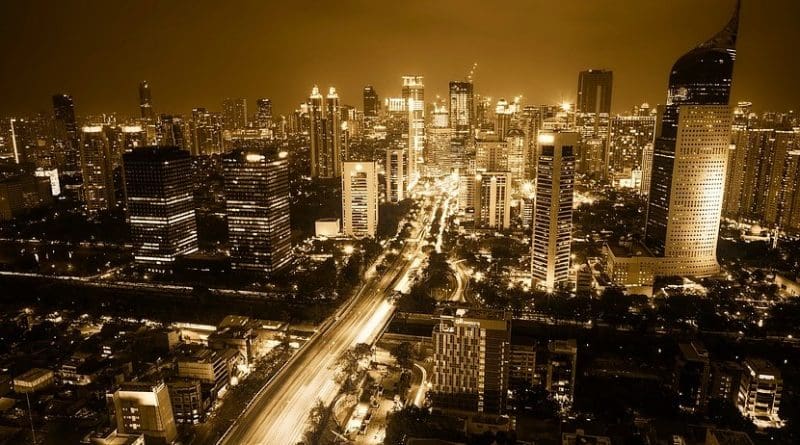India-Indonesia: A Natural Partnership For The Indo-Pacific – Analysis
By IPCS
By Ashutosh Nagda*
During his May 2018 visit to India, Indonesia’s Co-ordinating Minister for Maritime Affairs, Luhut Panjaitan, laid emphasis on a closer cooperation between India and Indonesia, suggesting it to be “important for balance of power in the region.” For India, which is looking to deepen its engagement in Southeast Asia to emerge as a regional power, Indonesia’s forthcoming gesture is a good sign, and a stronger partnership with Jakarta would be in New Delhi’s interest.
Indonesia’s Evolving Foreign Policy
As the world’s largest archipelagic country and Southeast Asia’s biggest economy, Indonesia has demonstrated an intent to play a leading role in the Indo-Pacific framework—a running theme in the policies of its current and previous administrations. Indonesia’s former President, Susilo Yudhoyono, advocated a policy of “thousand friends, zero enemies.” The main strategy of the government, as referred to by its then Foreign Minister, Marty Natalegawa, was that of achieving “dynamic equilibrium.” The core objective of this strategy is to create and maintain a system that builds trust between all involved parties and mutually agreed norms to ensure that no sole actor dominates the rest. This is the strategy Indonesia is currently employing to balance the US-China rivalry in the region.
For instance, at present, Jakarta’s foreign policy is anchored in Indonesia’s Global Maritime Fulcrum (GMF) doctrine, one that incumbent President Joko Widodo announced in 2014. The doctrine envisions increasing Indonesia’s interconnectedness by decreasing the development gap between the main and outer islands. It also envisions the Indonesian navy as a strong actor in the region’s maritime domain. Indonesia’s attempt, as explained by its incumbent Foreign Minister, Retno Marsudi, to “turn geopolitical competition into collaboration,” reflects the continuation of Yudhoyono’s strategy of “dynamic equilibrium.”
Overall, this policy of achieving a balanced and cooperative Indo-pacific region has opened doors for collaboration between various actors in the region. For instance, in New Delhi’s attempts to enhance its position as a regional power, Jakarta has found consonance for its policy of dynamic equilibrium.
India’s Policy for the Indo-Pacific
Since 2014, India has placed a heavy emphasis on its ‘Act East Policy’ to play a proactive role in Southeast Asia. Given the increasing strategic significance of the seas in the backdrop of China’s increasing inroads into Southeast Asia,cooperationon maritime issuesbetween India and the regional Indian Ocean littoral states has witnessed an upswing.
To illustrate, New Delhi has consistently advocated for a cooperative, secure and stable Indo-Pacific to foster collective growth and prosperity in the region. In his keynote address at the 2018 Shangri La dialogue, India’s Prime Minister Narendra Modi outlined New Delhi’s vision for the Indo-Pacific as “a common rules-based order,” and not as “a club of limited members” or a “grouping that seeks to dominate” or corner any one country. In the same address, Modi explained India’s vision of ‘Security and Growth for all in the Region’ (SAGAR) as a “creed” that India aims to follow to better connect with its “land and maritime partners to the east.” Through SAGAR, which was announced in 2015, India aims to work towards cooperation, sustenance and peaceful development in the region.
India-Indonesia: Evolving Convergence
Evidently, there exists a robust convergence in Indian and Indonesian regional outlooks and strategies as was the case during the Non-alignment Movement era. Modi’s vision of a free and open Indo-Pacific and Natalegawa’s conceptualisation of “Dynamic Equilibrium” (which Jokowi has carried forward) are complementary. Both share a common objective of developing cooperative power structuresas opposed to hegemony. This convergence has led to the adoption of the “Shared Vision on Maritime Cooperation in the Indo-Pacific” by the two countries. Among other objectives, this “Shared Vision,” envisions “strengthening their maritime cooperation for promotion of peace, stability and bringing in robust economic growth and prosperity to the Indo-Pacific region;” and fostering and upholding a sovereignty and “freedom of navigation and overflight.” The congruity in their respective strategies for the Indo-Pacific seems to have strengthened the case for mutual reliability. This is evidenced in the formulation of an India-Indonesia ‘Comprehensive Strategic Partnership’ and the bilateral arrangement pertaining to Indonesia’s Sabang port – both of which were announced alongside the “Shared Vision.”
Looking Ahead
For India, its active outreach in Southeast Asia has allowed it to present itself as a regional power capable of balancing prevailing dominant powers in the region. However, China, with its ambitious Belt and Road Initiative (BRI), remains a power to be reckoned with. Specifically, Beijing has been Jakarta’s largest trading partner since 2013, and in 2016, became the largest market for the latter’s exports. Today, China is Indonesia’s third largest source of foreign capital.
That said, Indonesia’s stance on the BRI is intriguing. For instance, Panjaitan, also doubles as Indonesia’s envoy for the BRI. Moreover, though Jakarta has pitched its GMF as an alternative to Beijing’s BRI, it has also signed five cooperation contracts worth US$ 23.3 billion under the BRI and is offering new projects worth up to US$ 60 billion to Chinese investors.
Meanwhile, although India and Indonesia have regularly emphasised on their desire to enhance ties in spheres such as economy, the pace of follow-up has been slow. To harness the prevailing momentum in bilateral relations, India must focus on strengthening its economic engagement with Indonesia because its investment in the latter remains minimal. More importantly, the need of the hour is for both countries to optimise implementation strategies and timelines of their numerous congruent plans for a free, rule-based and equitable Indo-Pacific.

